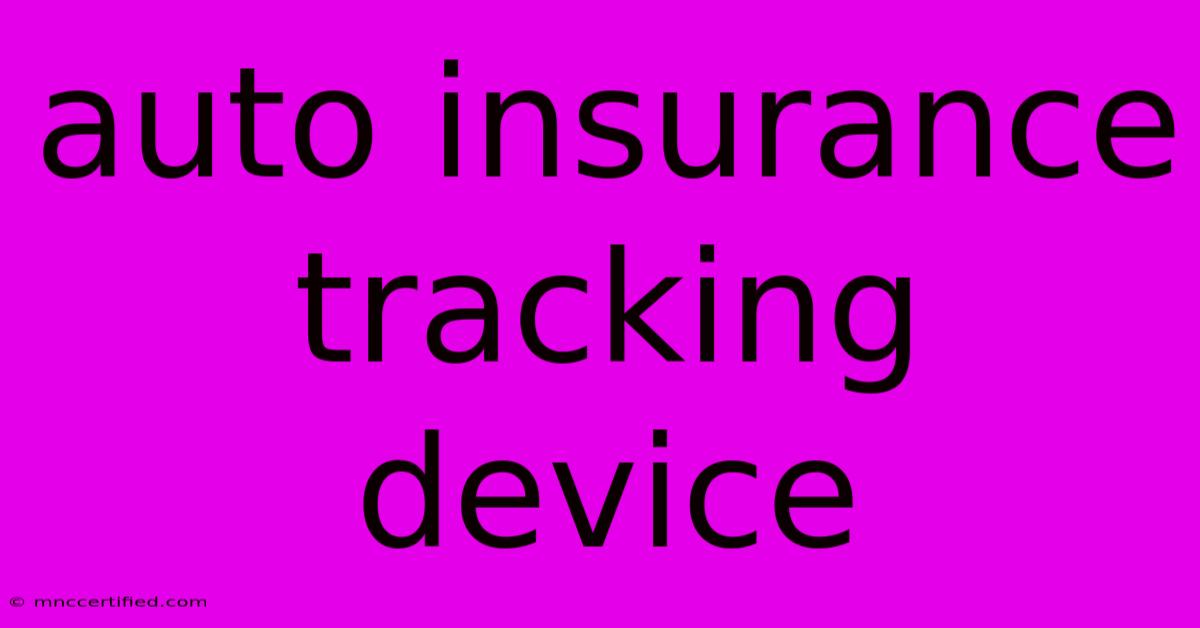Auto Insurance Tracking Device

Table of Contents
Auto Insurance Tracking Devices: A Comprehensive Guide
Are you considering using an auto insurance tracking device? These devices, sometimes called telematics devices, are becoming increasingly popular as a way to potentially lower your car insurance premiums. But how do they work, and are they right for you? This comprehensive guide will explore everything you need to know about auto insurance tracking devices.
How Auto Insurance Tracking Devices Work
Auto insurance tracking devices monitor your driving habits. This usually involves tracking several key metrics, including:
- Mileage: How many miles you drive each day and overall. Low-mileage drivers often qualify for discounts.
- Speed: Your average speed and instances of speeding. Excessive speeding can negatively impact your premiums.
- Acceleration and Braking: Harsh braking and rapid acceleration are indicators of risky driving behaviors.
- Time of Day: Some insurers analyze driving patterns at different times of day.
- Location: While precise location isn't always tracked, general location data might be used.
This data is transmitted wirelessly to your insurer, allowing them to assess your driving risk. The more safely you drive, the more likely you are to receive a discount.
Types of Auto Insurance Tracking Devices
There are a few different ways insurers use tracking technology:
- Plug-in Devices: These small devices plug into your car's onboard diagnostics (OBD-II) port, usually located under the dashboard. They are relatively easy to install and remove.
- Smartphone Apps: Some insurers use smartphone apps to track your driving. These apps use your phone's GPS and other sensors to monitor your driving behavior. This requires having your smartphone with you while driving.
- Hardwired Devices: These devices are professionally installed in your vehicle and are more permanently affixed. They often offer more comprehensive data collection.
Benefits of Using an Auto Insurance Tracking Device
The primary benefit is the potential for significant savings on your car insurance premiums. By demonstrating safe driving habits, you can earn discounts that can offset the cost of the device itself. Other benefits include:
- Improved Driving Habits: The device can help you become more aware of your driving behaviors and encourage safer driving practices.
- Increased Safety: Some devices offer features like crash detection and emergency response capabilities.
- Personalized Feedback: Many programs provide feedback reports, highlighting areas for improvement in your driving.
Drawbacks of Auto Insurance Tracking Devices
While the benefits are compelling, it's important to consider the potential drawbacks:
- Privacy Concerns: Data collected by the device is shared with your insurer. Some people are concerned about the privacy implications of this data collection.
- Device Malfunction: Like any technology, the device could malfunction, leading to inaccurate data and potential penalties.
- Lack of Control: You're giving your insurer access to a significant amount of data about your driving habits.
- Not Suitable for All Drivers: Frequent drivers or those who frequently drive in congested areas might not see as much of a benefit.
Choosing the Right Auto Insurance Tracking Device Program
Before signing up for a program, carefully consider these factors:
- Discounts Offered: Compare discounts offered by different insurers.
- Data Collected: Understand precisely what data is collected and how it will be used.
- Privacy Policy: Review the insurer's privacy policy carefully.
- Installation and Usage: Consider the ease of installation and use of the device or app.
- Customer Support: Ensure the insurer provides adequate customer support.
Frequently Asked Questions (FAQs)
Q: Can I opt out of the tracking program? A: Yes, you can usually opt out of the program at any time. However, this might result in a loss of the discount.
Q: What happens if my device malfunctions? A: Most insurers have procedures for dealing with device malfunctions. Contact your insurer immediately if you experience any problems.
Q: Is my data secure? A: Insurers are required to adhere to data privacy regulations. However, it's always advisable to read their privacy policy carefully.
Q: Will my premium increase if I drive unsafely? A: While premiums are unlikely to increase solely due to using a telematics device, consistently unsafe driving may lead to higher premiums, even if you are enrolled in a tracking program.
Conclusion
Auto insurance tracking devices offer a potential pathway to lower insurance premiums for safe drivers. However, it's crucial to weigh the benefits and drawbacks carefully and choose a program that aligns with your needs and privacy concerns. Thorough research and comparison shopping are vital before making a decision. Remember to read the fine print and understand exactly what you're agreeing to before enrolling in any telematics program.

Thank you for visiting our website wich cover about Auto Insurance Tracking Device. We hope the information provided has been useful to you. Feel free to contact us if you have any questions or need further assistance. See you next time and dont miss to bookmark.
Featured Posts
-
Sporting Cp Vs Arsenal Gunners 5 1 Victory
Nov 27, 2024
-
Texas Farm And Ranch Insurance
Nov 27, 2024
-
Wendy Williams Health Update
Nov 27, 2024
-
S Owns A Life Insurance Policy
Nov 27, 2024
-
Insurance Conference Las Vegas
Nov 27, 2024